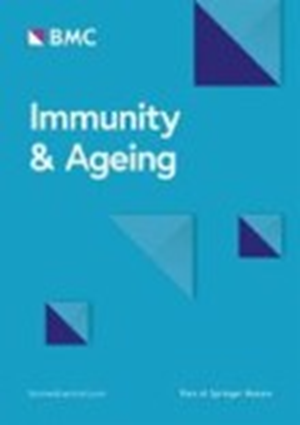环境温度升高会加速蚊子的衰老,降低寿命并恶化感染结果
IF 5.6
2区 医学
Q1 GERIATRICS & GERONTOLOGY
引用次数: 0
摘要
大多数昆虫都是变温动物和外温动物,因此它们的体温取决于环境温度。随着气候变化,昆虫的体温不断升高,这影响了昆虫的发育、生存和对感染的反应。衰老也会影响昆虫的生理机能,因为衰老会使身体状况恶化,免疫能力减弱。衰老通常从时间或年代年龄的角度来考虑,但也可以从身体功能或生理年龄的角度来概念化。我们假设,较高的温度会加速昆虫的衰老,从而使昆虫的计时年龄和生理年龄脱钩。为了研究这个问题,我们在 27 °C、30 °C 和 32 °C的温度下饲养非洲疟蚊冈比亚疟蚊,并测量其在成年后 1 天、5 天、10 天和 15 天的存活率。然后,我们测量了大肠杆菌感染的强度,以确定环境温度和衰老之间的相互作用如何影响蚊子对感染的反应。我们证明,蚊子感染细菌后寿命会缩短,温度越高蚊子寿命越短,年龄越大的蚊子越容易死亡,温度越高会稍微加快蚊子存活率随年龄增长而下降的速度。此外,我们还发现大肠杆菌的感染强度会随着温度升高和年龄增长而增加,温度升高会加快感染强度随年龄增长而增加的速度。最后,我们发现温度升高会影响细菌和蚊子的生理机能。较高的环境温度会加速蚊子的衰老,从而对寿命和感染结果产生负面影响。这些发现对昆虫如何在气候变暖的世界中充当授粉者、农业害虫和疾病传播媒介具有重要意义。本文章由计算机程序翻译,如有差异,请以英文原文为准。
Warmer environmental temperature accelerates aging in mosquitoes, decreasing longevity and worsening infection outcomes
Most insects are poikilotherms and ectotherms, so their body temperature is predicated by environmental temperature. With climate change, insect body temperature is rising, which affects how insects develop, survive, and respond to infection. Aging also affects insect physiology by deteriorating body condition and weakening immune proficiency via senescence. Aging is usually considered in terms of time, or chronological age, but it can also be conceptualized in terms of body function, or physiological age. We hypothesized that warmer temperature decouples chronological and physiological age in insects by accelerating senescence. To investigate this, we reared the African malaria mosquito, Anopheles gambiae, at 27 °C, 30 °C and 32 °C, and measured survival starting at 1-, 5-, 10- and 15-days of adulthood after no manipulation, injury, or a hemocoelic infection with Escherichia coli or Micrococcus luteus. Then, we measured the intensity of an E. coli infection to determine how the interaction between environmental temperature and aging shapes a mosquito’s response to infection. We demonstrate that longevity declines when a mosquito is infected with bacteria, mosquitoes have shorter lifespans when the temperature is warmer, older mosquitoes are more likely to die, and warmer temperature marginally accelerates the aging-dependent decline in survival. Furthermore, we discovered that E. coli infection intensity increases when the temperature is warmer and with aging, and that warmer temperature accelerates the aging-dependent increase in infection intensity. Finally, we uncovered that warmer temperature affects both bacterial and mosquito physiology. Warmer environmental temperature accelerates aging in mosquitoes, negatively affecting both longevity and infection outcomes. These findings have implications for how insects will serve as pollinators, agricultural pests, and disease vectors in our warming world.
求助全文
通过发布文献求助,成功后即可免费获取论文全文。
去求助
来源期刊

Immunity & Ageing
GERIATRICS & GERONTOLOGY-IMMUNOLOGY
CiteScore
10.20
自引率
3.80%
发文量
55
期刊介绍:
Immunity & Ageing is a specialist open access journal that was first published in 2004. The journal focuses on the impact of ageing on immune systems, the influence of aged immune systems on organismal well-being and longevity, age-associated diseases with immune etiology, and potential immune interventions to increase health span. All articles published in Immunity & Ageing are indexed in the following databases: Biological Abstracts, BIOSIS, CAS, Citebase, DOAJ, Embase, Google Scholar, Journal Citation Reports/Science Edition, OAIster, PubMed, PubMed Central, Science Citation Index Expanded, SCImago, Scopus, SOCOLAR, and Zetoc.
 求助内容:
求助内容: 应助结果提醒方式:
应助结果提醒方式:


